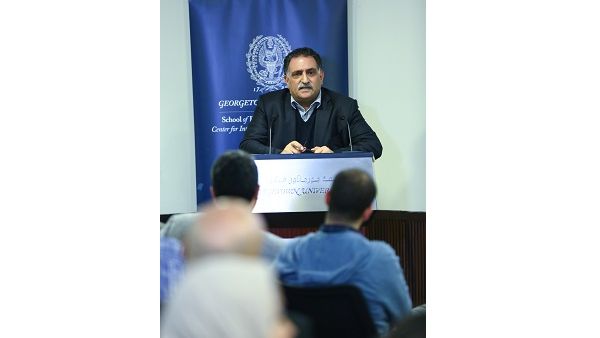Azmi Bishara talks Democracy in the Middle East at Georgetown

‘Did Democracy lose this round? And Why?’ Arab political researcher and intellectual Dr. Azmi Bishara delved into the complexities of democracy in the Middle East at a recent talk at the Center for International and Regional Studies (CIRS) at Georgetown University in Qatar.
Bishara, who is the general director of the Arab Center for Research and Policy Studies, shared his thoughts on why the Arab uprisings have often lacked the political vision to turn mass protest action into transformed democratic states. Drawing on developments in Tunisia, Egypt and Syria, Bishara explained that a culture of democracy is needed among those who take power, in order to ensure sustained change.
“Democratic revolution cannot win without support from political elites,” he said, detailing how a plan for democracy is needed, not just calls for change. He also expounded on the difficulties of achieving political change without support or agreement from the military, especially in countries with sizeable armies.
The event, which formed part of the CIRS monthly dialogue series, brought together academic scholars, students, and invited guests to engage with the prominent researcher and writer.
“Throughout Europe and the Americas, as well as in the Middle East and elsewhere, democracy is confronting serious challenges at both the elite level and among ordinary citizens,” said CIRS Director Dr. Mehran Kamrava. “I am excited that we had the opportunity to hear an analysis of the issue by Azmi Bishara, one of the Arab world's most serious contemporary thinkers.”
Bishara has written numerous academic books and papers on subjects ranging from political thought to social theory and philosophy. A former professor of Philosophy and History of Political Thought, he co-founded Muwatin, the Palestinian Institute for the Study of Democracy, and Mada al-Carmel, the Arab Center for Applied Social Research.
Bishara was also the principal founder of the National Democratic Assembly (Balad), a Palestinian-Arab political party, which he represented as an elected member of parliament for four consecutive sessions. In 2007, Bishara was persecuted for his political positions, and now resides in Qatar. He was the recipient of the Ibn Rushd Prize for Freedom of Thought in 2002 and the 2003 Global Exchange Human Rights Award.
Background Information
Georgetown University in Qatar
Established in 1789 in Washington, DC, Georgetown University is one of the world’s leading academic and research institutions. Georgetown University in Qatar (GU-Q), founded in 2005 in partnership with Qatar Foundation, seeks to build upon the world-class reputation of the university through education, research, and service. Inspired by the university’s mission of promoting intellectual, ethical, and spiritual understanding, GU-Q aims to advance knowledge and provide students and the community with a holistic educational experience that produces global citizens committed to the service of humankind.
Located in Doha’s Education City, GU-Q offers the same internationally recognized Bachelor of Science in Foreign Service degree as Georgetown’s Capitol Campus in Washington, DC. This unique, interdisciplinary program prepares students to tackle the most important and pressing global issues by helping them develop critical thinking, analytic, and communication skills within an international context. GU-Q alumni work in leading local and international organizations across industries ranging from finance to energy, education, and media. The Qatar campus also serves as a residency and delivery location for the Executive Master’s in Emergency and Disaster Management along with the Executive Master’s in Leadership.






